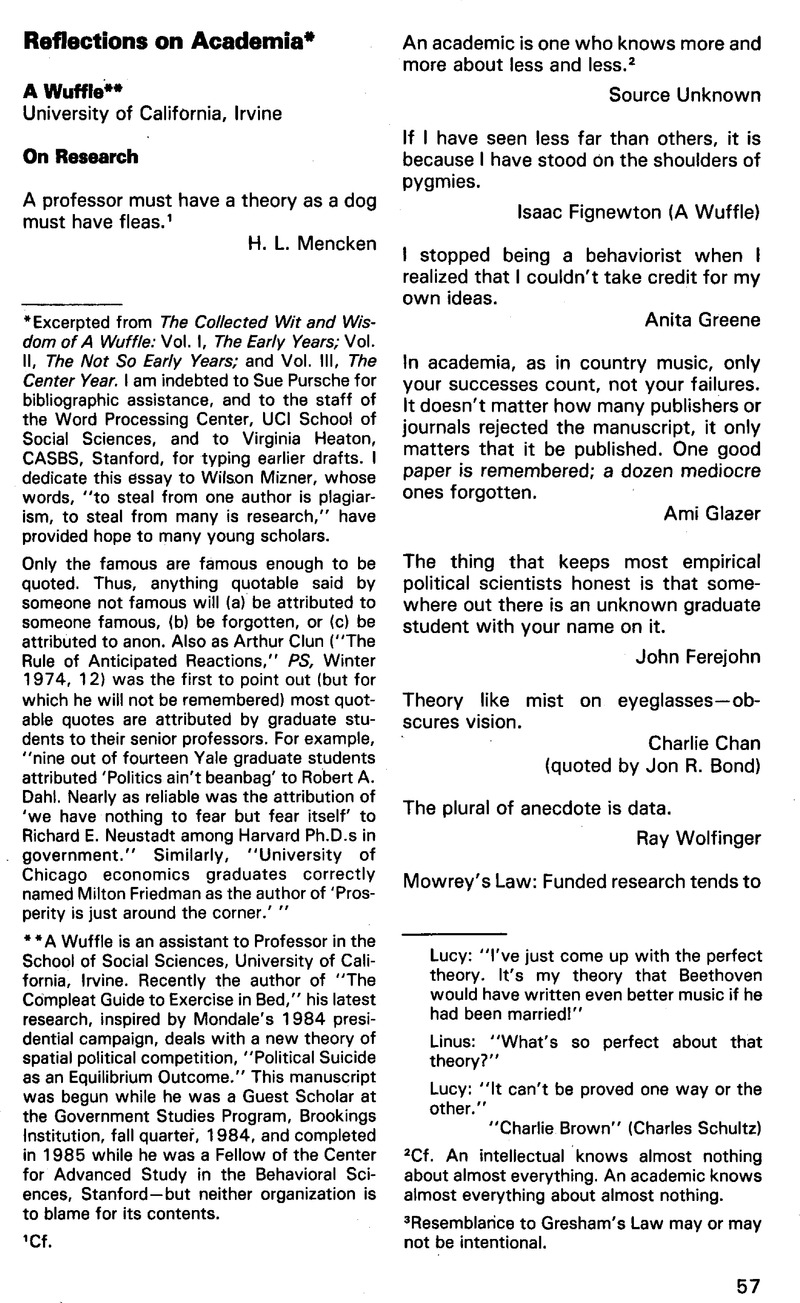Article contents
Reflections on Academia
Published online by Cambridge University Press: 21 November 2022
Abstract

- Type
- Other
- Information
- Copyright
- Copyright © The American Political Science Association 1986
Footnotes
Excerpted from The Collected Wit and Wisdom of A Wuffle: Vol. I, The Early Years; Vol. II, The Not So Early Years; and Vol. III, The Center Year. I am indebted to Sue Pursche for bibliographic assistance, and to the staff of the Word Processing Center, UCI School of Social Sciences, and to Virginia Heaton, CASBS, Stanford, for typing earlier drafts. I dedicate this essay to Wilson Mizner, whose words, “to steal from one author is plagiarism, to steal from many is research,” have provided hope to many young scholars.
Only the famous are famous enough to be quoted. Thus, anything quotable said by someone not famous will (a) be attributed to someone famous, (b) be forgotten, or (c) be attributed to anon. Also as Arthur Clun (“The Rule of Anticipated Reactions,” PS, Winter 1974, 12) was the first to point out (but for which he will not be remembered) most quotable quotes are attributed by graduate students to their senior professors. For example, “nine out of fourteen Yale graduate students attributed ‘Politics ain't beanbag’ to Robert A. Dahl. Nearly as reliable was the attribution of ‘we have nothing to fear but fear itself’ to Richard E. Neustadt among Harvard Ph.D.s in government.” Similarly, “University of Chicago economics graduates correctly named Milton Friedman as the author of ‘Prosperity is just around the corner.’”
A Wuffle is an assistant to Professor in the School of Social Sciences, University of California, Irvine. Recently the author of “The Compleat Guide to Exercise in Bed,” his latest research, inspired by Mondale's 1984 presidential campaign, deals with a new theory of spatial political competition, “Political Suicide as an Equilibrium Outcome.” This manuscript was begun while he was a Guest Scholar at the Government Studies Program, Brookings Institution, fall quarter, 1984, and completed in 1985 while he was a Fellow of the Center for Advanced Study in the Behavioral Sciences, Stanford—but neither organization is to blame for its contents.
References
1 Cf.
Lucy: “I've just come up with the perfect theory. It's my theory that Beethoven would have written even better music if he had been married!”
Linus: “What's so perfect about that theory?”
Lucy: “It can't be proved one way or the other.”
“Charlie Brown” (Charles Schultz)
2 Cf. An intellectual knows almost nothing about almost everything. An academic knows almost everything about almost nothing.
3 Resemblance to Gresham's Law may or may lot be intentional.
4 Cf. The quote attributed to Mae West, “I don't care what they say about my morals as long as they spell my name right.”
5 Cf. “The great tragedy of science is the slaying of a beautiful hypothesis by an ugly fact.” Thomas Huxley
6 I.e., no more than one idea is ever remembered from any research paper. Most papers, however, are simply not remembered. (Whether there were any ideas there to be remembered remains an open question.)
7 In general, allocation of authorship credit is not zero-sum. The exception is married couples—only one of whom (usually the husband) is ever given credit for co-authored work.
8 By that test, economics may have claim to science—it was Lord Keynes who said, “In the long run we are all dead”—perhaps the only consistently accurate prediction ever made by a macroeconomist. On the other hand, historians have shown some ability to predict the past (or at least to show its inevitability). (Cf. the Fagin-Wuffle Law: “Hindsight is the only exact science.”) Political scientists have been predicting the disintegration of the U.S. party system for nearly two decades. If we wait long enough, they're sure to be right. The most famous prediction in anthropology is that of Levi-Strauss: “Cannibals who eat kin should boil them; cannibals who eat strangers should roast them.” Unfortunately for structuralist theory, this prediction is false. Indeed, baking is the most common cooking method used by anthropopagi; moreover, “natives … have discovered a veritable smorgasbord of ways of preparing people” ( Shankman, Paul, “Le Roti et le Boulli,” American Anthropologist, Vol. 71 (1961), at p. 61 Google Scholar, quoted in Harris, Marvin, Cultural Materialism, Random House, 1979: 189 Google Scholar).
9 Cf.
Q: “Why didn't the political scientist climb the mountain?”
A: “Because the statistical program to do so wasn't available in SPSS.”
10 In fairness to Poincaré, he wrote this at a time before modern political science had been invented.
11 Cf. “Politics is too important to be left to economists” (A Wuffle, July 29, 1981).
12 Publish or perish is not, however, meant to be taken literally. In April, 1984, a University of South Carolina assistant professor who was denied tenure kidnapped the president of the university and unsuccessfully sought to convince him to reverse the tenure denial. When that strategy failed, the assistant professor committed suicide. Cf. Confucius Say: “He who has assistant professors for friends need not watch soap operas.”
- 4
- Cited by


